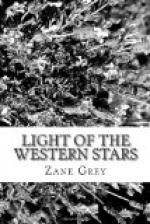In the lonely distances and the passionless stars of boldly painted stage scenery she had caught a glimpse of something that stirred her soul. The feeling did not last. She could not call it back. She imagined that the very boldness of the scene had appealed to her; she divined that the man who painted it had found inspiration, joy, strength, serenity in rugged nature. And at last she knew what she needed—to be alone, to brood for long hours, to gaze out on lonely, silent, darkening stretches, to watch the stars, to face her soul, to find her real self.
Then it was she had first thought of visiting the brother who had gone West to cast his fortune with the cattlemen. As it happened, she had friends who were on the eve of starting for California, and she made a quick decision to travel with them. When she calmly announced her intention of going out West her mother had exclaimed in consternation; and her father, surprised into pathetic memory of the black sheep of the family, had stared at her with glistening eyes. “Why, Madeline! You want to see that wild boy!” Then he had reverted to the anger he still felt for his wayward son, and he had forbidden Madeline to go. Her mother forgot her haughty poise and dignity. Madeline, however, had exhibited a will she had never before been known to possess. She stood her ground even to reminding them that she was twenty-four and her own mistress. In the end she had prevailed, and that without betraying the real state of her mind.
Her decision to visit her brother had been too hurriedly made and acted upon for her to write him about it, and so she had telegraphed him from New York, and also, a day later, from Chicago, where her traveling friends had been delayed by illness. Nothing could have turned her back then. Madeline had planned to arrive in El Cajon on October 3d, her brother’s birthday, and she had succeeded, though her arrival occurred at the twenty-fourth hour. Her train had been several hours late. Whether or not the message had reached Alfred’s hands she had no means of telling, and the thing which concerned her now was the fact that she had arrived and he was not there to meet her.
It did not take long for thought of the past to give way wholly to the reality of the present.
“I hope nothing has happened to Alfred,” she said to herself. “He was well, doing splendidly, the last time he wrote. To be sure, that was a good while ago; but, then, he never wrote often. He’s all right. Pretty soon he’ll come, and how glad I’ll be! I wonder if he has changed.”




